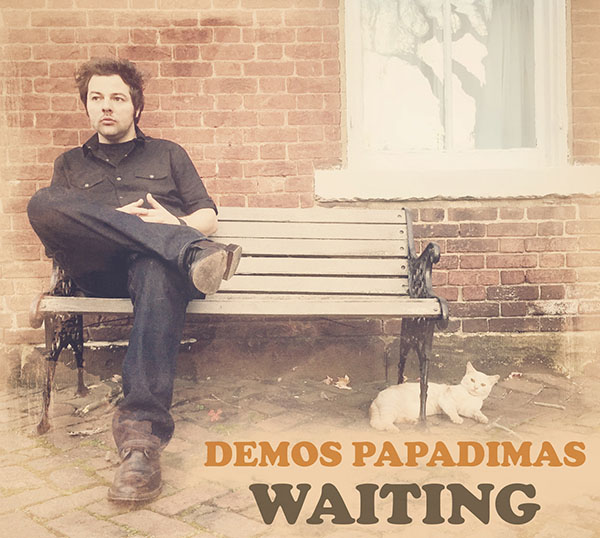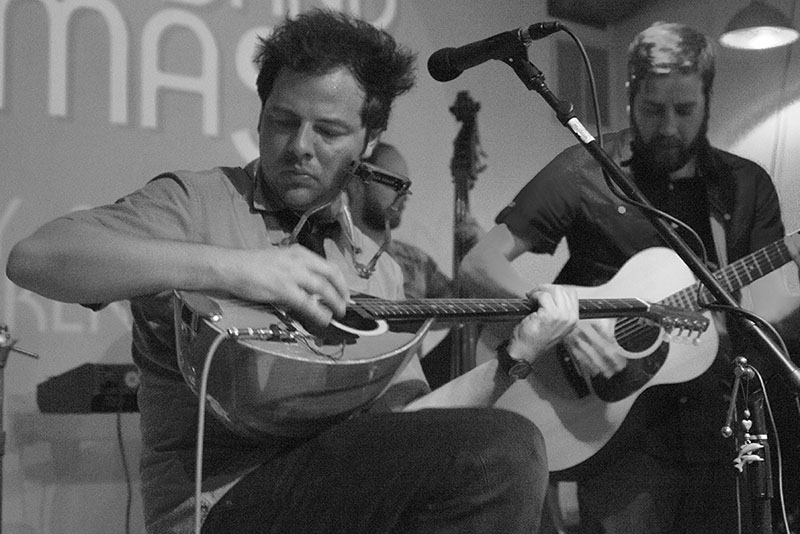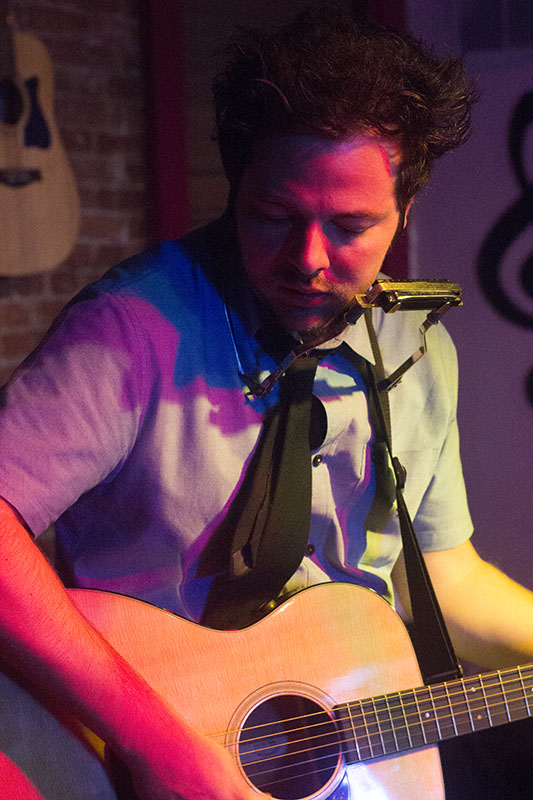
The Lowdown:
November 29, 2016
November Featured Review
Demos Papadimas: Waiting
by Jason D. 'Diesel' Hamad
With Waiting, Youngstown’s Demos Papadimas brings his Greco-Americana style into new territory where wistful, philosophical lyrics dominate.
While he spends most of his time on classically American instruments like acoustic and resonator guitars, Papadimas’ four-string bouzouki adds a distinctly Greek flair to many of his songs. Photo by Jason D. ‘Diesel’ Hamad, No Surf Music.
“Nothing to get you dancin’ like murder ballads,” says Demos Papadimas, musing specifically about a traditional that anchors his newest release, Waiting, but saying something important about his musical philosophy in general.
“I can write fairly upbeat music naturally,” he says, “but lyrically… I don’t know.”
Papadimas’ Greco-Americana style is a musical portmanteau inspired by his own background. An American mother introduced him to Bob Dylan, from whom he worked back into this country’s folk and blues, while a Greek immigrant father provided a grounding in the Hellenic musical canon. He blends elements of both cultures’ traditions into an intriguing mash-up where bouzouki and pedal steel are equally at home.
On his best days, Papadimas is philosophical; on his worst, downright melancholic. Maybe it’s the other way around. But his are thoughtful, wistful lyrics paired with kinetic music that could easily transfer energy to listeners’ extremities. It’s a juxtaposition that he embraces and one he believes is perfectly in tune with the musical traditions from which he draws.
“If you look at a lot of old [American] folk songs, they were tough songs. And it’s upbeat stuff that people can dance to,” he says. “And the Greek tradition, Greek rebetiko music, all of the songs—I mean people will hear it and if they don’t speak Greek they’ll think this is some stereotypical Greek dancing kind of thing—but the songs are about heartbreak, rejection, desperation, alcoholism, all these tough themes.”
“I think in general,” he says of his compositions, “there’s a lot about searching and finding some kind of meaning that goes through all music. If you just boil it all down, it’s searching for meaning and kind of searching for love. None of [the songs on Waiting] are love songs, but love is present in all of them. Or absent and noted by its absence. Bitterly.”
He asks far more questions than he answers. Determinations are left to the audience.
“Most of my songs are questions, to some extent… The songs I write aren’t necessarily songs with a lot of characters coming in and out of them, but it’s more like pointing a mirror within. The kind of philosophical reflections that you have. What’s more important than the direction and the perspective on the world we live in?”
Take, for instance, the album’s flagship track. The Dylanesque “Red Letter Days” is a wistful rumination that seems to question rumination itself. Perhaps the best way to describe the song is as an existentialist version of Bruce Springsteen’s “Glory Days,” longing perhaps for a time when what’s important was boldly prescribed in scarlet script by the learnèd masters, but at the same time looking for a way to break out in new directions:
The mystics speak of wisdom, priests eternity,
And I have contemplated both so endlessly.
Think of grains and think of loss, but whatever the cost
It’ll never do
When red letter days are through.
Red letter days are through.
Nowhere to go. No way to know.
No way to know and it’s long, long gone.
Shouldn’t matter to you now.
The shuffling piece is filled out by ringing Hammond chords, stretched pedal steel and a jangling, bouncy electric guitar and highlighted by Papadimas’ standout harmonica breaks.
Wanderlust is the order of the day for the album’s opening track as the breathy blows of Demos’ harp act as a starting gun signaling the jump of the racing “Just a Stranger.” The song about a Guthriesque ramblin’ man is a high-octane burst right out of the gates with a charging drum beat and quick-sawed fiddle. It explores identity and the feeling of never belonging endemic to the life of anyone who beats the path of the road less taken:
He’s just a stranger; everybody knows,
No matter what country, what pair of clothes.
Been on the high roads; he’s been down below.
Still can’t just figure out the way to go.
Been on the East Coast and the Midwest,
In foreign countries as a welcome guest.
Still got a heartache and he just can’t be blessed
And it’s all leavin’ him feelin’ second guessed.
And he knows that it takes so long.
And he knows that he ain’t wrong.
Searcin’ to find just where he belongs.
Could take a lifetime of movin’ on.
While the portrait painted is not exactly glamorous, one gets the feeling that Papadimas nevertheless longs for the migratory lifestyle described, preferring a life of searching to a more sedentary position.
The somewhat sedate “Second Street” recalls Papadimas’ days in New York. Seeming more Dylan Thomas than Bob Dylan with its visions of bar hopping, morning hangovers, and wasted days turning into wasted lifetimes, its sound is filled out by sustained organ and sliding pedal steel.
Perhaps the most Hellenic song on the album, the title track “Waiting” is dominated by Papadimas’ bouzouki and is born out of his yearly pilgrimage to his ancestral homeland. It examines questions of identity and place.
“It’s essentially the concept of ‘What is tangible?’” Demos explains. ”’What is real?’” It does so by setting him in a world in which he is welcomed but never home:
So now I’m ramblin’ down these ancient streets
Once traveled daily by philosophers and priests.
I ain’t got their wisdom but I know how to speak.
Still, I just can’t think straight in this Athenian summer heat.
Used to be that I was waiting
For some lost sense to reappear.
Now it seems I was mistaken,
‘Cause you can’t lose something that wasn’t there.
“Another Story” seems to examine the futility of running counter to the prevailing view as well as the insular nature of the individual, the sonder-laden lament that an individual life is inevitably lost in the greater narrative society creates to justify its march through history. Also, it’s a war song:
There’s six white horses in a line
In the town square by the billboard sign.
Another man has been laid out,
One more story we’ll live without.
It seems he fell before his time
And lost track of his life’s designs.
Sent far away to the border lines
To wage a war that was a crime.
Where side by side, one by one they fell
And saw their truth turned into hell.
Made it back home from the front lines
To wage a war within his mind.
Starting at a dirge’s pace, the piece kicks up to a diesel-driven tempo filled with soaring violin and incessant bass peppered with accordion, resulting in a sense of almost paranoiac urgency.
With its particularly unsettling pedal steel, “Restless Time” is the philosophy of a harrowed mind, the portrait of one who thinks action into oblivion, a tale of analytical depression:
I searched for that past, wherever the hell it was,
But you know you’ll see whatever you want as every dreamer does.
The world can be round or it can be flat.
It all depends on angles and the stage of life you’re at.
In restless time with a ramblin’ mind,
Fortune coming undone.
In the space between visions of diluted dreams
Tryin’ to get out of restless time.
“Writing that, I was really trying to summarize the essence of my perspective,” Papadimas explains about this passage. “Everything in life just depends on how you look at it. Objective, subjective, all of it. You see what you want to see and believe what you want to believe… Everything in life comes down to that. It just depends on your perspective and where you are in life.”
Demos also plays the role of music historian by breathing new vigor into two traditionals, placed side-by-side right in the middle of the collection. The first is “Ragged & Dirty,” originally recorded by Willie Brown but undoubtedly coming down via Bob Dylan, whose quick-paced arrangement is closer to Demos’ take, which falls squarely in the country blues category with its prominent fiddle and harmonica.
The second classic, the murder ballad “Little Sadie,” was first recorded in 1930 by Clarence Ashley but also later covered by Dylan. It has long been a high-energy highlight of Papadimas’ live shows. Opening with a very untraditional grecofied resonator guitar part, it is made all the more foreboding thanks to Al Moss’ pedal steel. And yes, you can dance to it.
Perhaps the greatest juxtaposition of the disparate traditions Papadimas draws upon can be found in the pairing of “Bitter Cup”—a slow-stepping ode to self-destructive thinking (and perhaps alcoholism) that nevertheless begs for whirling dancers to accompany its bouzouki and accordion—with its follow-on track “Halfway Real”—another lamentation over standing still and a stasis of mindset wrapped up in the ruins of a failed relationship. Built over organ and pedal steel and highlighted by harmonica, the track’s fast-paced musical action belies Papadimas’ typically dark lyrics.
“I wrote [‘Bitter Cup’] as an old Greek rebetiko song,” he explains. “The intention was to write a song lyrically that could be translated word-for-word to be in Greek. But at the end of that song it goes into another song, ‘Halfway Real,’ which has this pedal steel intro. Geographically, if you were placing those songs, there’s no question that after this very Greek sounding thing, you’re going down South in the United States somewhere.
Mixing tradition and innovation, Papadimas has delivered another winner with Waiting. Photo by Jason D. 'Diesel' Hamad, No Surf Music.
“The sequencing is intentional. That’s very much who I am, to be able to put those two things side-by-side. This guy likes a good bouzouki but he loves a pedal steel part.”
Waiting deftly blends traditions even as it adds unique elements and serves as a solid follow up to 2012’s Wandering Through the Wilderness. It’s more Greek, with several stand out bouzouki parts, even as it’s more American with the addition of Al Moss’ haunting pedal steel to the mix, proving that the unique stylistic blend Papadimas has created still has room to evolve. And Demos’ wistful, philosophical lyrics continue to generate songs that keep the listener engaged and thinking. Papadimas likes to say that “tradition is an innovation of another time,” and if you’re looking for an album that combines the best musical and lyrical innovations of the past and today, Waiting is just what you’re seeking.
| mp3 |
|---|









Follow @NoSurfMusic